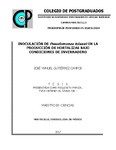Inoculación de Pseudomonas tolaasii en la producción de hortalizas bajo condiciones de invernadero
Abstract
El objetivo del presente trabajo fue cuantificar el efecto de la inoculación de Pseudomonas tolaasii sobre el crecimiento, rendimiento y calidad de frutos de chile pimiento morrón y pepino producidas en cultivo sin suelo. En almácigo se llevó acabo la producción de plántulas de chile pimiento morrón y pepino que constó de dos tratamientos (no inoculado, e inoculación con P. tolaasii) bajo un diseño experimental completamente al azar (DECA). Además, al trasplante se cortaron secciones delgadas del cepellón de las plántulas de los tratamientos inoculados. En microscopio equipado con lámpara fluorescente fueron capturadas imagenes secuenciales en 10x. Mosaico de imágenes se elaboraron y se analizaron en el programa Erdas, donde se obtuvo la localización de las bacterias de la rizósfera. En la producción de pepino y chile pimiento morrón se utilizó un DECA con arreglo factorial 2x2. Un factor fue la solución Steiner a concentraciones (50% y 75%) y el segundo factor con y sin inoculación con P. tolaasii, para un total de cuatro tratamientos por cultivo. En la evaluación de plántulas de chile pimiento morrón y pepino, la inoculación incrementó hasta 24% el volumen radical. La distribución de P. tolaasii en los dos cultivos fueron principalmente en la raíz y la materia orgánica ligeramente descompuesta. En la producción de pepino las plantas inoculadas con P. tolaasii e irrigados solución Steiner 50% con presentaron mayor volumen radical. En pimiento la irrigación con solución Steiner 75% e inoculados con P. tolaasii incrementó los sólidos solubles totales. La inoculación de Pseudomonas tolaasii tiene efecto la fisiología de plántulas de chile pimiento morrón y pepino. La distribucción de P. tolaasii en plántulas de chile pimiento morrón y pepino es influenciada por la zona rizósferica de cada especie. El crecimiento, la producción y la calidad de la cosecha de pepino es influenciada por la solución Steiner. En chile pimiento morrón la inoculación y la concentración de la solución Steiner no modifica el crecimiento y la producción. _______________ INOCULATION OF Pseudomonas tolaasii IN THE PRODUCTION OF VEGETABLES UNDER GREENHOUSE CONDITIONS. ABSTRACT: The objective of the present work was to quantify the effect of inoculation of Pseudomonas tolaasii on the growth, yield and quality of bell peppers and cucumbers produced without soil. The production of seedlings of bell pepper and cucumber was carried out in seedbeds, which consisted of two treatments (not inoculated, and inoculation with P. tolaasii) under a completely randomized experimental design (CRED). In addition to the transplant, thin sections of the root ball of the inoculated treatments were cut. In microscope equipped with a fluorescent lamp, sequential images were captured in 10x. Mosaic images were developed and analyzed in the Erdas program, where the location of rhizospheric bacteria was obtained. In the production of cucumber and bell pepper, a CRED with a 2x2 factorial arrangement was used. One factor was the Steiner solution at concentrations (50% and 75%) and the second factor with and without inoculation with P. tolaasii, for a total of four treatments per culture. In the evaluation of bell pepper and cucumber seedlings, the inoculation increased the radical volume up to 24%. The distribution of P. tolaasii in the two crops was mainly in the root and in slightly decomposed organic matter. In the production of cucumber, plants inoculated with P. tolaasii and irrigated with 50% Steiner solution had a higher radical volume. In bell pepper, irrigation with 75% Steiner solution and inoculated with P. tolaasii increased the total soluble solids in fruit. Inoculation of P. tolaasii has effect on the physiology of bell pepper and cucumber seedlings. The distribution of P. tolaasii in bell pepper and cucumber seedlings is influenced by the rhizospheric zone of each species. In cucumber the growth, production and quality of harvest is influenced by Steiner solution. In bell pepper the inoculation and concetration Steiner solution does not modify the growth and production.
Collections
- Tesis MC, MT, MP y DC [349]


